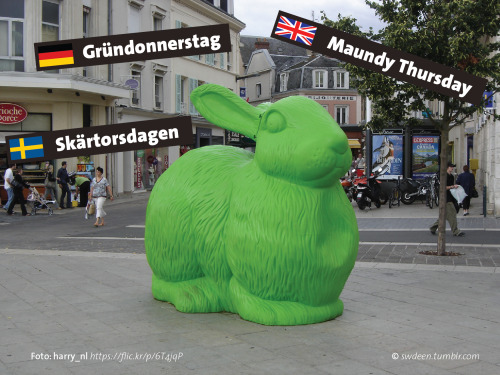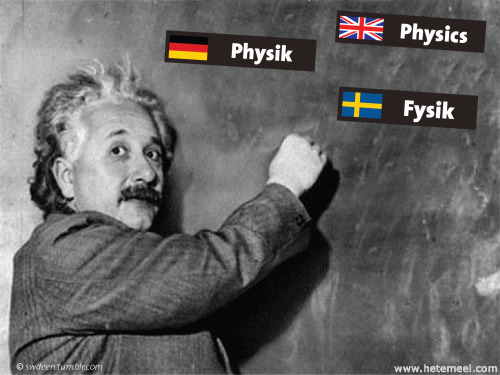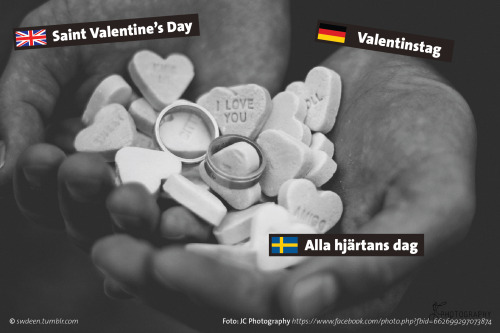#german words
Today is »Maundy Thursday«. In German it is called »Gründonnerstag« (literally: »Green Thursday«) and the Swedish name for the fifth day in the Holy Week is »Skärtorsdagen« (lit.: »The Clean Thursday«).
Where does the differences come from?
The English term »Maundy« derives from the Latin word »Mandatum« and is a religious rite where one washes the feet of someone. This rite is described in the Bible by several disciples who observed Jesus washing the feet of the twelve apostles before the Last Supper.
The Swedish word »skär« is an old nordic term and has been used to describe something as »clean, nice, white«. The origin is the same as in English.
How come, the German call the day »Green Thursday«?
There are several explanations that can be found—unfortunately no one can say what the correct one is.
- Today is the day where the sinners get their sins freed by the church. The Bible describes this rite metaphoric as a part to recover as »green wood«. For this occasion members of the church wore white dresses often with green ribbons.
- Another explanation is, that there is still the period of fasting and that the Christians eat especially green food like vegetables, green cabbage and salad. Furthermore it has been the day where the spring often begins and the people tilled their fields.
- A third explanation is that »grün« does not really describe the color green but rather derives from »greinen« which means crying and refers to being sad because of Jesus’ coming death.
Photo: harry_nl: https://flic.kr/p/6T4jqP
Post link
An airbag is a very palpable description for the life-saver inside a vehicle. Airbags are—of course—bags inflating within milliseconds after crashing into something. The most common airbag can be found in the front seats of cars and has the function to protect the head from an impact.
»Airbag« is a loan word in German that is used in everyday speech. It is interesting to note, that the invention can be traced back to Germany. Mr. Walter Lindener ranks as the inventor with his patent registered in 1951 in Munich. However, the name »airbag« came much later. In 1974 GM released cars with »Air Cushion Restrain Systems«. In the 80’s and 90’s the airbag systems became more common and as did the name »airbag«. Not only in English speaking countries but also in Germany.
Although German has its own words to describe the function of an airbag, they were never really used. Ask a native-speaker how »Luftsack« or »Prallkissen« sounds to him/her and you will often hear answers like ridiculous.
In comparison to German the Swedish language used its own word. In Swedish the airbag it is called »krockkudde« and is a two noun word consisting of the word »krock« for »collision« and »kudde« for »cushion/pillow«.
Photo:
Jørgen Schyberg https://flic.kr/p/7LdWQ
Idea:
Evasundine1 https://twitter.com/evasundin1/statuses/451256048150904832
Post link
Discover the differences and similarities between the three languages.
To find out more about loan words written with »ph«, see my former posts like philosophy,phobiaandphysics.
Thanks for contributing some words adaldag =)
Do you have further words?
Post link
Another great example how the Swedish language deals with loan words with a »ph« from Ancient Greek. »Physics« means »knowledge of nature«.
For further examples check the last posts.
Do you find more?
Post link
Ein Teddybär ist ein Kuscheltier, dessen Namenspatron Theodore »Teddy« Roosevelt ist. Als der damalige Präsident der USA 1902 auf Bärenjagd in Mississippi war und sich keine Gelegenheit bot, einen Bären zu erlegen, bot man ihm an, ein angeleintes Bärenbaby zu erschießen. Dies lehnte Theodore Roosevelt ab. Ein anwesender Karikaturist der Washington Post hielt die Szene in einem Bild fest und so wurde der Bär zum Symbol des Präsidenten.
Ein russischer Einwanderer in Brooklyn warb daraufhin mit einem Stoffbären »Teddy’s bear« im Schaufenster seines Ladens.
Parallel zu dieser Geschichte gibt es noch ein deutsches Pendant, das das Steiff-Museum erzählt. Über den Sekretär von Theodor Roosevelt kam seine Tochter an einen Stoffbären, der von Margarete Steiff hergestellt wurde. Da die Tochter großen Gefallen am Bären fand, benannte sie ihn nach ihrem Vater »Teddy«. 1903 bestellte ein amerikanischer Händler 3.000 Teddybären bei der Firma Steiff.
Zur Wortherkunft von Bär, Bear, Björn:
Es gibt verschiedene Ansätze, jedoch gilt als am wahrscheinlichsten die Theorie, dass »Bär« auf die Farbe »Braun« zurückzuführen sei.
Im Schwedischen hat der Teddybär auch noch einen weiteren gängigen Namen. »Nallebjörn« oder schlicht »Nalle«, was eventuell aus dem finnischen »Nalli« entlehnt wurde.
Teddybjörnen Fredriksson ist ein bekanntes Kinderlied in Schweden. Schaut es euch hier bei »Lotta på Liseberg« an: http://www.youtube.com/watch?v=yNYnwfl6ABE
Foto:
Terence Hill: http://flic.kr/p/7T8VrV
Quellen:
http://de.wikipedia.org/wiki/Teddybär
http://en.wikipedia.org/wiki/Teddy_bear
http://en.wikipedia.org/wiki/Nalle
Post link
Happy Saint Valentine’s Day everybody!
Schönen Valentinstag euch allen!
Glad Alla hjärtans dag på er!
Post link

Most Common Nouns in German PS: Learn German with the best FREE online resources, just click here: https://www.germanpod101.com/?src=tumblr_nouns-2_image_060222

Most Common Adjectives in German PS: Learn German with the best FREE online resources, just clickhere:https://www.germanpod101.com/?src=tumblr_adjectives-10_image_053122

1️⃣Choose 1 Verb in German. 2️⃣Use it in a sentence. 3️⃣Comment your sentence below! P.S. Learn German with the best FREE online resources, just click here https://www.germanpod101.com/?src=tumblr_verbs-13_image_052622

Sentence Components in German ⚙️ PS: Learn German with the best FREE online resources, just click here https://www.germanpod101.com/?src=tumblr_sentence-component_image_052422

Negative Sentences in German! PS: Learn German with the best FREE online resources, just click herehttps://www.germanpod101.com/?src=tumblr_negative-sentence_image_052022

Verb Pairs in German PS: Learn German with the best FREE online resources, just click here https://www.germanpod101.com/?src=tumblr_verb-pairs_image_051722

Do you know how to write your #Resume in #German? PS: Learn German with the best FREE online resources, just click here https://www.germanpod101.com/?src=tumblr_resume_image_051222

Most Common Nouns in German P PS: Learn German with the best FREE online resources, just click here: https://www.germanpod101.com/?src=tumblr_nouns-9_image_060922

Personal Care Items in German! P PS: Learn German with the best FREE online resources, just click here: https://www.germanpod101.com/?src=tumblr_personal-care_image_060722
in germany we have a word called “durchwurschteln” which is literally translated into “sausage yourself through your troubles” and that is beautiful
also don’t forget:
- es geht um die Wurst - the sausage is at stake - it’s now or never, it’s neck or nothing
- die Wurstigkeit - sausage-y-ness - a noun that describes the feeling of not caring about something
- die beleidigte Leberwurst spielen - to act like an offended liver sausage - to act offended, especially if there isn’t a reason for it






